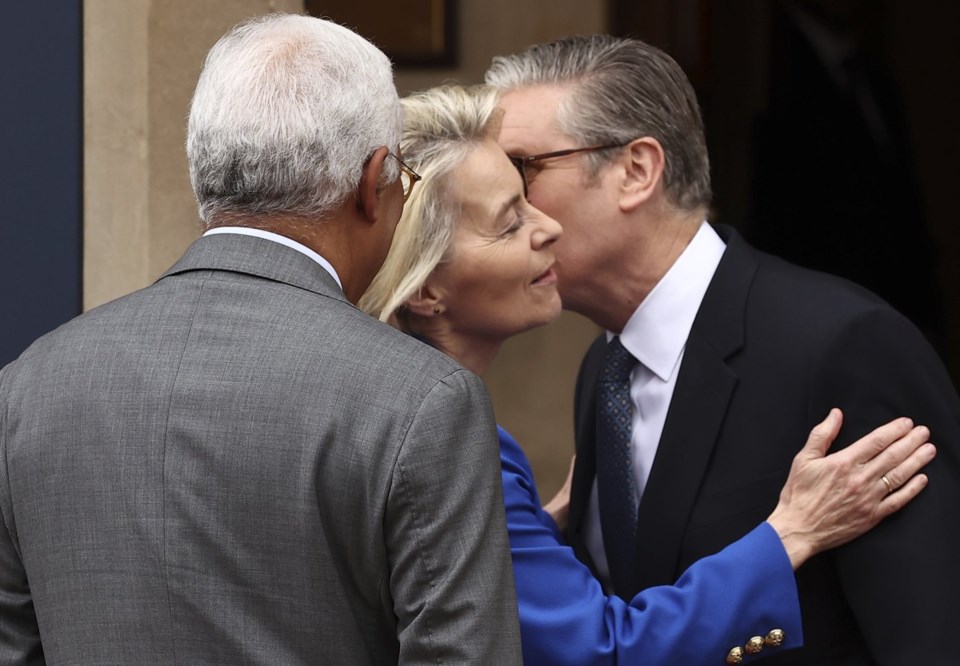LONDON (AP) — Britain’s government said Monday it has struck new agreements with the European Union on boosting defense cooperation, easing food trade and border checks.
Prime Minister Keir Starmer said the deals will slash red tape, grow the British economy and reset relations with the 27-nation trade bloc since the U.K. left the EU in 2020.
Starmer hosted European Commission President Ursula von der Leyen and other senior EU officials in London for the first formal U.K.-EU summit since Brexit.
Under the deals, a new U.K.-EU defense and security partnership will allow the U.K. to access a EU defense loan program worth 150 billion euros ($170 billion.)
Other agreements include removing some checks on animal and plant products to ease food trade across borders, and a 12-year extension of an agreement allowing EU fishing vessels in U.K. waters.
“It’s time to look forward. To move on from the stale old debates and political fights to find common sense, practical solutions which get the best for the British people,” Starmer said.
While the EU is the U.K.’s largest trading partner, the U.K. has been hit with a 21% drop in exports since Brexit because of more onerous border checks, laborious paperwork and other barriers.
Resetting relations
Since becoming prime minister in July, Starmer has sought to reset relations with the EU, following years of tensions in the wake of the U.K.'s 2016 Brexit referendum.
Post-Brexit relations have been governed by a trade agreement negotiated by then Prime Minister Boris Johnson. Starmer thinks that can be improved in a way that boosts trade and bolsters security.
“This is about making people better off, about making the country more secure, about making sure there are more jobs in the U.K.,” Trade Secretary Jonathan Reynolds told Times Radio.
Stronger ties with the EU will bring “more benefits for the United Kingdom” following trade agreements that the U.K. struck in recent weeks with India and the United States, Starmer said.
Non-tariff barriers
Though no tariffs are slapped on the export of goods between both sides, an array of non-tariff barriers have made trade more difficult.
Post-Brexit visa restrictions have also hobbled the cross-border activities of professionals such as bankers or lawyers, as well as cultural exchanges, including touring bands and school trips.
Since the Labour Party took power last year after 14 years of Conservative government, a period that was largely marked by upheavals surrounding the Brexit vote and its aftermath, both sides have sought to improve relations.
That’s been most evident in the more coordinated response to Russia’s full-scale invasion of Ukraine in the wake of a change of approach by Washington following the return of U.S. President Donald Trump.
But Starmer has stressed that the U.K. won't rejoin the EU's frictionless single market and customs union, nor agree to the free movement of people between the U.K. and the EU.
Security, fishing and youth mobility
Talks on strengthening ties have focused largely on security and defense, and on a youth mobility plan that would allow young Britons and Europeans to live and work temporarily in each other’s territory.
That remains a politically touchy issue in the U.K., seen by some Brexiteers as inching back toward free movement — though the U.K. already has youth mobility arrangements with countries including Australia and Canada.
Another issue that has long been a sticking point in U.K.-EU relations is fishing — an economically minor but symbolically important issue for the U.K. and EU member states such as France. Disputes over the issue nearly derailed a Brexit deal back in 2020.
The summit is also expected to cover aligning standards on the sale of agricultural products, which could eliminate costly checks on food products exported across the English Channel.
Thomas-Symonds said he was confident that trade could be improved for food imports and exports.
“We know we’ve had lorries waiting for 16 hours, fresh food in the back not able to be exported, because frankly it’s just going off, red tape, all the certifications that are required, we absolutely want to reduce that,” he told the BBC.
Opposition objects to a ‘surrender’
Some of the trade-offs may prove difficult for Starmer, who faces growing challenges from the pro-Brexit and anti-immigration Reform U.K. party and will likely see accusations of “betraying Brexit,” whatever the outcome of the talks.
Reform, which recently won big in local elections, and the opposition Conservative Party have already called the deal a “surrender” to the EU before any details were confirmed.
Trump, who has backed Brexit, could also be a potential headache for Starmer.
“The reset could still be blown off course by disagreements over how to consolidate existing areas of cooperation like fisheries and/or external factors, such as a negative reaction from the U.S. to the U.K. seeking closer ties with the EU,” said Jannike Wachowiak, research associate at the UK in a Changing Europe think tank.
Sylvia Hui, Pan Pylas And Jill Lawless, The Associated Press




